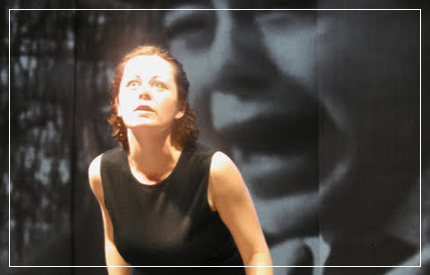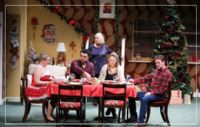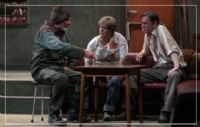REVIEW: Belfast Blues
Date: 20/08/2019
Theatre Review

The best thing about the timeless (an oft-used word, but it really does apply here) Belfast Blues, written and performed by Geraldine Hughes and directed by Carol Kane of Unbreakable Kimmy Schmidt fame, are the simple things.
The little moments that we remember which take what might otherwise be a routine sprawling epic of a life well lived to the individual, and the individual alone, and lift it into the pantheon of uniqueness. These moments, the real-life memories of an exceptional actress parlayed into theatre for everyone to appreciate, are the kind which emerge from deeply troubling foundations, but are conveyed swiftly and often amusingly as well as regretfully.
It is sobering, yes, but it's also rather groovy – as sobering, and as groovy, as the cover of "What’s So Funny About Peace, Love, and Understanding" that closes the play. Because as much as we enjoy the music in the play and in the song, there's nothing really all that funny about the words. It matters not how famous you are, or will become – you have to work, and work hard, for peace, love and understanding. It’s something we see not only in Hughes but also in the sightings and buildings of a modern-day Belfast which would surely have been a pipe dream to those who grew up during the Troubles.
See Belfast Blues, and find yourself imagining a time when the Divis flats could look and feel the real deal – when they weren't seen as a concrete jungle, but merely a place to live, with every amenity you could want. See a childhood where idealism develops fortitude in a fortress, where one can learn and grow, taking joy from fish sandwiches, ice creams and Holy Communions, and harrowing pain from depictions of street violence. Even as external forces tossed, and still toss, relentless spanners in our works, we cut our teeth, we live and learn, and we strengthen. That’s a great message to carry forward.
All this, and the numerous nuances in Hughes' performance, partly inspired by Kane's guiding hand. The stark and starry-eyed facial and physical impressions and expressions that bring a multitude of male and female characters, young and old, to life, as her compelling story leads us through the survival of her Belfast blues to her big break with the great George Schaefer. Therein lies another exposure of the line between love and life, or business and pleasure – even as Schaefer listens to, learns from, takes on board and keeps in touch with the young Hughes after her role in Children Of The Crossfire, what kind of bond is it? Are these the sort of ties that endure on a personal or professional level? And, perhaps more tellingly, how do family react to seeing a loved one screen? There does seem to be an everlasting gap between the real and the make-believe which, to this day, no one has really figured out how to bridge.
It may be difficult, but it is also truthful, to hear Hughes regarding education as more important than stardom, because it really is no different today – a reality must always lie behind a dream just in case. That's one aspect of many in Belfast Blues which elevates you to cloud nine before bringing you down to earth with a bang. Which is not to call the production a bipolar play, but rather, a doubly effective one, with an impact of exceptional force on both sides of a coin of life that unites generations through the power of identification. Belfast Blues is a masterpiece.
Simon Fallaha
Belfast Blues ran at the Lyric Theatre until Sunday August 11.
The little moments that we remember which take what might otherwise be a routine sprawling epic of a life well lived to the individual, and the individual alone, and lift it into the pantheon of uniqueness. These moments, the real-life memories of an exceptional actress parlayed into theatre for everyone to appreciate, are the kind which emerge from deeply troubling foundations, but are conveyed swiftly and often amusingly as well as regretfully.
It is sobering, yes, but it's also rather groovy – as sobering, and as groovy, as the cover of "What’s So Funny About Peace, Love, and Understanding" that closes the play. Because as much as we enjoy the music in the play and in the song, there's nothing really all that funny about the words. It matters not how famous you are, or will become – you have to work, and work hard, for peace, love and understanding. It’s something we see not only in Hughes but also in the sightings and buildings of a modern-day Belfast which would surely have been a pipe dream to those who grew up during the Troubles.
See Belfast Blues, and find yourself imagining a time when the Divis flats could look and feel the real deal – when they weren't seen as a concrete jungle, but merely a place to live, with every amenity you could want. See a childhood where idealism develops fortitude in a fortress, where one can learn and grow, taking joy from fish sandwiches, ice creams and Holy Communions, and harrowing pain from depictions of street violence. Even as external forces tossed, and still toss, relentless spanners in our works, we cut our teeth, we live and learn, and we strengthen. That’s a great message to carry forward.
All this, and the numerous nuances in Hughes' performance, partly inspired by Kane's guiding hand. The stark and starry-eyed facial and physical impressions and expressions that bring a multitude of male and female characters, young and old, to life, as her compelling story leads us through the survival of her Belfast blues to her big break with the great George Schaefer. Therein lies another exposure of the line between love and life, or business and pleasure – even as Schaefer listens to, learns from, takes on board and keeps in touch with the young Hughes after her role in Children Of The Crossfire, what kind of bond is it? Are these the sort of ties that endure on a personal or professional level? And, perhaps more tellingly, how do family react to seeing a loved one screen? There does seem to be an everlasting gap between the real and the make-believe which, to this day, no one has really figured out how to bridge.
It may be difficult, but it is also truthful, to hear Hughes regarding education as more important than stardom, because it really is no different today – a reality must always lie behind a dream just in case. That's one aspect of many in Belfast Blues which elevates you to cloud nine before bringing you down to earth with a bang. Which is not to call the production a bipolar play, but rather, a doubly effective one, with an impact of exceptional force on both sides of a coin of life that unites generations through the power of identification. Belfast Blues is a masterpiece.
Simon Fallaha
Belfast Blues ran at the Lyric Theatre until Sunday August 11.





































